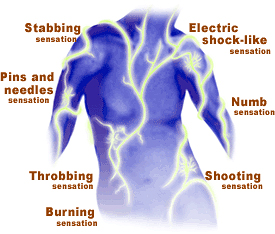Hudds scientist wins British Pain Society Clulow Award
Thu, 16 Jan 2014 12:03:00 GMT
“...pain is a highly subjective phenomenon and sensitivities vary from patient to patient...”
 IN the UK alone, an estimated 7.8 million people have their lives blighted by chronic pain, and 44 per cent are failing to receive an accurate diagnosis and appropriate treatment. Now, a University of Huddersfield scientist, backed by funding from the British Pain Society and crucial support from the National Institute of Health Research, is embarking on research which aims to help doctors diagnose and treat one of the least understood but most widespread sources of chronic suffering.
IN the UK alone, an estimated 7.8 million people have their lives blighted by chronic pain, and 44 per cent are failing to receive an accurate diagnosis and appropriate treatment. Now, a University of Huddersfield scientist, backed by funding from the British Pain Society and crucial support from the National Institute of Health Research, is embarking on research which aims to help doctors diagnose and treat one of the least understood but most widespread sources of chronic suffering.
Dr Patrick McHugh will use blood plasma samples from hundreds of patients in the UK and Ireland in order to learn more about chronic neuropathic pain. Caused by faulty signals from the nervous system, it takes many forms and affects an estimated seven out of every 100 people. An ageing population and rising rates in diseases such as diabetes and cancer are exacerbating the problem.
But chronic neuropathic pain is a complex condition and an acknowledged blind spot in medical care and research. It does not respond well to conventional painkillers and clinicians sometimes resort to opioids, which often prove to be addictive.
Dr McHugh has now been awarded the prestigious Clulow Award, bestowed once every two years by the British Pain Society. It will enable him to build on his existing research in the field and identify “biomarkers” which indicate when chronic neuropathicpainis present. New treatments could then be developed.
Currently, there are no specific drugs for the condition. “But if a doctor or clinician can determine what type of pain is present, they might be able to manage it better,” said Dr McHugh.
In 2012, he received a research grant from the Pain Relief Foundation, which enabled him to launch research into a biochemical pathway named BH4. Now the British Pain Society’s Clulow Award will fund two years of research that will be conducted in tandem with the Centre for Pain Research at the National University of Ireland, in Galway, plus the Leeds Pallium Research Group, whose members include the Leeds Teaching Hospitals NHS Trust. The Government-funded National Institute of Health Research has signalled approval of the research project and this is a major factor in securing NHS co-operation.
The UK and Irish partners will provide Dr McHugh with a total of 320 blood samples – 120 from patients diagnosed as suffering from neuropathic pain and 120 from healthy people, as a control. Then, using facilities at the University of Huddersfield, he will conduct analysis that could lead to a greater understanding of the condition and the molecular factors that influence it.
Pain is a highly subjective phenomenon and sensitivities vary from patient to patient, says Dr McHugh. This adds to the difficulties of diagnosis.
“But if a clinician can quickly and specifically nail down what type of pain it is, then they can find more effective treatment strategies.”
At the University of Huddersfield’s School of Applied Sciences, Dr McHugh will be joined in the research project by PhD student David Buckley, who is a qualified pharmacist. They will use techniques including real-time quantitative PCR and mass spectrometry, enabling them to investigate factors such as changes in the production of gene products that could be a factor in chronic neuropathic pain.







